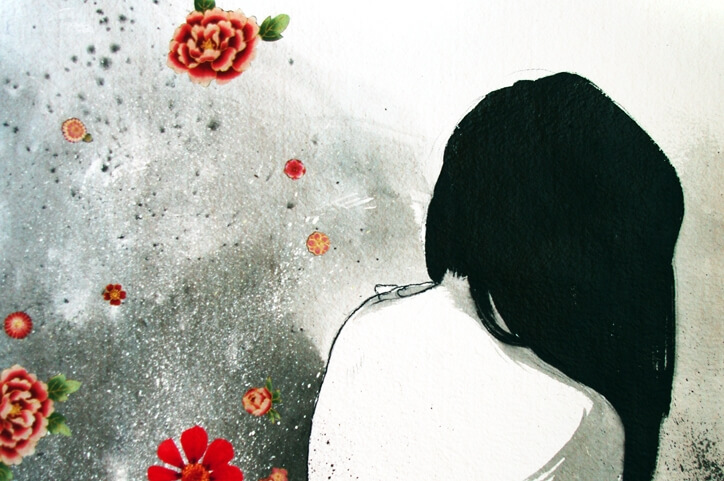5 Things to Think About If You Want to Free Your Emotions

Emotions enable us to relate to others, but we tend to hide them. There are 4 essential or basic emotions (though some claim there are more): sadness, anger , fear, and joy. Out of this group, there is only one we consider positive. However, this is a value that society gives; it’s not inherent. Thus, making the distinction between negative and positive can be an impediment if you want to free your emotions.
Because of the experiences we’ve had when we were vulnerable and hurt, we begin to hide our sadness by projecting an image of strength. We don’t express our anger because we fear the disapproval of others. We hide the fear causing us to control our joy because, many times, we don’t want to draw attention to ourselves by spontaneously expressing emotion.
“Doubts, fears, and insecurities prevent us from expressing what, by nature, should be expressed.”
1. Free your emotions: remember that your emotions are important
The situations mentioned above are the product of “underestimating” your emotions and their importance compared to, for example, intelligence. You may think that emotions make you weak. Thinking this all the time does nothing more than repress your emotions and cause problems.
By not giving importance to your emotions, you become an expert in “swallowing” everything you do not want to feel. But this will make you feel very poorly in the long run. You’ll find that the accumulated emotions are more than you can handle. You will struggle for control and start to suffocate.

Do you want these emotions to overpower you in a work meeting, making you explode at the slightest problem? Do you want to lash out at a friend because of the jealousy you’ve harboring for months? If you’ve ever gone through these situations or wish to avoid them — if you want to free your emotions — it’s time to change the way you approach your emotional management.
2. Be conscious when you release emotions
Perhaps you tried to free your emotions once and ended up with a terrible feeling of guilt. This happens when you express your emotions without being conscious. Keep in mind that we must communicate what we feel well, and respect the other person.
A lack of consciousness is also evident when you repress your emotions so much that you end up exploding spontaneously. If you do that, you have no mercy, you don’t care who’s in your way.
That’s why it’s better to express your emotions on your terms, and when you are in control. Open your eyes and empathize with the person in front of you. This way you’ll keep from hurting them or yourself because you didn’t know how to manage the situation well.
3. Don’t wait, express emotions when you need to
The key to keeping your emotions from getting out of control is to express yourself when you need to. However, that doesn’t mean you can do so in any situation. In a job interview or similar situation, it would not be appropriate to express strong emotions.
However, in these cases you should make sure to express those emotions as soon as is appropriate. Where do you feel safe to free your emotions? Where do you have the confidence to express what’s deep inside? Go there and open up.
If you feel anger, punch a pillow, kick a ball. If you are afraid, allow yourself to tremble. Cry if you are sad. Scream if you want to scream. Ask someone for a hug if you need to be held.

4. Beware of cyclical emotions
Emotions don’t usually last very long. Think about joy: it’s momentary. It doesn’t last for hours and hours. However, when an emotion lasts longer than “normal”, we go from talking about an emotion to talking about an emotional state.
For example, you may feel sad, but if that sadness starts to take over your thoughts and you go round and round, becoming anxious, you are trapping that emotion and preventing it from following its natural course.
We must learn how to distinguish when we should let the emotion go. We have to be careful not to feed these thoughts too long with our insecurities, fears, and beliefs. Sometimes, we make a mountain out of a molehill.
5. Take your environment into account
If you find yourself in an environment where you’re constantly being told “don’t cry”, or “you smile too much”, or “don’t get so mad”, know that you have the right to express yourself. Do it out of respect for yourself and others.
The important thing is that you don’t stop expressing what you feel just because others are upset. Though society tries to teach us to hide our emotions, it’s not the healthy choice. If you need to express your emotions, do it. There’s nothing wrong with it!
“When you express your emotions, remember: do not harm yourself, do not harm others.”
-Martha Sialer-
All our life we are constantly told not to express our emotions. In the end, we get into a habit of keeping everything we want to say and express inside. And we hurt ourselves with this harmful habit.
We shouldn’t let our emotions poison us just because other people might get upset when we express them. Repressing our emotions causes them to fester in our brain and take over our thoughts, lasting longer than they should. We can avoid all this. Free your emotions.
Emotions enable us to relate to others, but we tend to hide them. There are 4 essential or basic emotions (though some claim there are more): sadness, anger , fear, and joy. Out of this group, there is only one we consider positive. However, this is a value that society gives; it’s not inherent. Thus, making the distinction between negative and positive can be an impediment if you want to free your emotions.
Because of the experiences we’ve had when we were vulnerable and hurt, we begin to hide our sadness by projecting an image of strength. We don’t express our anger because we fear the disapproval of others. We hide the fear causing us to control our joy because, many times, we don’t want to draw attention to ourselves by spontaneously expressing emotion.
“Doubts, fears, and insecurities prevent us from expressing what, by nature, should be expressed.”
1. Free your emotions: remember that your emotions are important
The situations mentioned above are the product of “underestimating” your emotions and their importance compared to, for example, intelligence. You may think that emotions make you weak. Thinking this all the time does nothing more than repress your emotions and cause problems.
By not giving importance to your emotions, you become an expert in “swallowing” everything you do not want to feel. But this will make you feel very poorly in the long run. You’ll find that the accumulated emotions are more than you can handle. You will struggle for control and start to suffocate.

Do you want these emotions to overpower you in a work meeting, making you explode at the slightest problem? Do you want to lash out at a friend because of the jealousy you’ve harboring for months? If you’ve ever gone through these situations or wish to avoid them — if you want to free your emotions — it’s time to change the way you approach your emotional management.
2. Be conscious when you release emotions
Perhaps you tried to free your emotions once and ended up with a terrible feeling of guilt. This happens when you express your emotions without being conscious. Keep in mind that we must communicate what we feel well, and respect the other person.
A lack of consciousness is also evident when you repress your emotions so much that you end up exploding spontaneously. If you do that, you have no mercy, you don’t care who’s in your way.
That’s why it’s better to express your emotions on your terms, and when you are in control. Open your eyes and empathize with the person in front of you. This way you’ll keep from hurting them or yourself because you didn’t know how to manage the situation well.
3. Don’t wait, express emotions when you need to
The key to keeping your emotions from getting out of control is to express yourself when you need to. However, that doesn’t mean you can do so in any situation. In a job interview or similar situation, it would not be appropriate to express strong emotions.
However, in these cases you should make sure to express those emotions as soon as is appropriate. Where do you feel safe to free your emotions? Where do you have the confidence to express what’s deep inside? Go there and open up.
If you feel anger, punch a pillow, kick a ball. If you are afraid, allow yourself to tremble. Cry if you are sad. Scream if you want to scream. Ask someone for a hug if you need to be held.

4. Beware of cyclical emotions
Emotions don’t usually last very long. Think about joy: it’s momentary. It doesn’t last for hours and hours. However, when an emotion lasts longer than “normal”, we go from talking about an emotion to talking about an emotional state.
For example, you may feel sad, but if that sadness starts to take over your thoughts and you go round and round, becoming anxious, you are trapping that emotion and preventing it from following its natural course.
We must learn how to distinguish when we should let the emotion go. We have to be careful not to feed these thoughts too long with our insecurities, fears, and beliefs. Sometimes, we make a mountain out of a molehill.
5. Take your environment into account
If you find yourself in an environment where you’re constantly being told “don’t cry”, or “you smile too much”, or “don’t get so mad”, know that you have the right to express yourself. Do it out of respect for yourself and others.
The important thing is that you don’t stop expressing what you feel just because others are upset. Though society tries to teach us to hide our emotions, it’s not the healthy choice. If you need to express your emotions, do it. There’s nothing wrong with it!
“When you express your emotions, remember: do not harm yourself, do not harm others.”
-Martha Sialer-
All our life we are constantly told not to express our emotions. In the end, we get into a habit of keeping everything we want to say and express inside. And we hurt ourselves with this harmful habit.
We shouldn’t let our emotions poison us just because other people might get upset when we express them. Repressing our emotions causes them to fester in our brain and take over our thoughts, lasting longer than they should. We can avoid all this. Free your emotions.
This text is provided for informational purposes only and does not replace consultation with a professional. If in doubt, consult your specialist.







